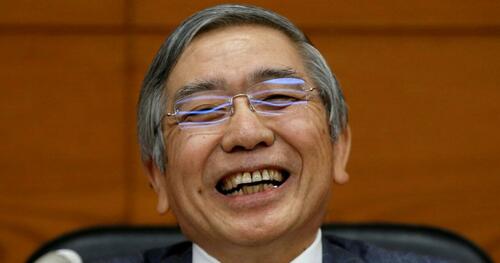
In the end, despite some expectations for fireworkers, Kuroda ended his central banking career with a whimper.
On March 9-10, the BOJ held its Monetary Policy Meeting (MPM), and in a unanimous vote decided to maintain the status quo across all monetary policy parameters, including yield curve control (YCC) and asset purchase programs, in line with most expectations. The tolerable band for the 10-year JGB yield was also kept at plus/minus 50bp. The BOJ also maintained forward guidance, which is tied to the pandemic situation and states that it “expects short- and long-term policy interest rates to remain at their present or lower levels,” as expected.
Ahead of the meeting, Goldman notes that "some market participants were of the view that the BOJ would eliminate YCC entirely or adjust it further at today's MPM, as it was the last for Governor Haruhiko Kuroda, to alleviate the burden on the next governor, Kazuo Ueda."
The BOJ maintained its overall assessment of the economy at "has picked up as the resumption of economic activity has progressed while public health has been protected from COVID-19." By category, the BOJ downgraded its assessment on exports and production, to "they have been more or less flat," from "have increased as a trend." On consumption, the assessment was unchanged as "increased moderately," while the BOJ added "despite being affected by price rises" to its statement.
Regarding the inflation outlook, the BOJ maintained the view that the CPI “is likely to decelerate toward the middle of fiscal 2023 due to the effects of pushing down energy prices from the government’s economic measures and to a waning of the effects of a pass-through to consumer prices of cost increases led by a rise in import prices."
Meanwhile, the government's proposal to appoint Kazuo Ueda as the next BOJ governor and Shinichi Uchida and Ryozo Himino as deputy governors (each to five-year terms) has been formally approved following majority endorsements by the Lower House on March 9 and the Upper House on March 10. The new leadership will take up their roles after Governor Kuroda's term expires on April 8, and the current deputy governors' terms end on March 19.
Japanese stocks maintained losses after the Bank of Japan reiterated an easing stance at its policy meeting. Market sentiment was hurt by the plunge in US bank shares on concern over the financial health of Silicon Valley Bank. The Topix Index fell 1.2% to 2,046.17 as of 12:35 p.m. Tokyo time, while the Nikkei declined 0.9% to 28,361.62. Mitsubishi UFJ Financial Group Inc. contributed the most to the Topix Index decline, decreasing 3.5%.
According to Credit Agricole the yen will track US Treasuries as investors await the next monetary policy moves by the Bank of Japan under the leadership of incoming Governor, Kazuo Ueda.
“JPY will continue to move inversely with UST yields. We would caution investors that further inversion of the UST yield curve could act as a cap on USD/JPY upside,” says David Forrester, strategist in Singapore adding that "Ueda will likely want to settle into the Governorship for a meeting or two before considering making any changes."
“The relatively short deliberation and unanimous vote really shows the BOJ didn’t want to change policy today” which is good: the last thing the market needs now is even more shocks.
In the end, despite some expectations for fireworkers, Kuroda ended his central banking career with a whimper.
On March 9-10, the BOJ held its Monetary Policy Meeting (MPM), and in a unanimous vote decided to maintain the status quo across all monetary policy parameters, including yield curve control (YCC) and asset purchase programs, in line with most expectations. The tolerable band for the 10-year JGB yield was also kept at plus/minus 50bp. The BOJ also maintained forward guidance, which is tied to the pandemic situation and states that it “expects short- and long-term policy interest rates to remain at their present or lower levels,” as expected.
Ahead of the meeting, Goldman notes that “some market participants were of the view that the BOJ would eliminate YCC entirely or adjust it further at today’s MPM, as it was the last for Governor Haruhiko Kuroda, to alleviate the burden on the next governor, Kazuo Ueda.”
The BOJ maintained its overall assessment of the economy at “has picked up as the resumption of economic activity has progressed while public health has been protected from COVID-19.” By category, the BOJ downgraded its assessment on exports and production, to “they have been more or less flat,” from “have increased as a trend.” On consumption, the assessment was unchanged as “increased moderately,” while the BOJ added “despite being affected by price rises” to its statement.
Regarding the inflation outlook, the BOJ maintained the view that the CPI “is likely to decelerate toward the middle of fiscal 2023 due to the effects of pushing down energy prices from the government’s economic measures and to a waning of the effects of a pass-through to consumer prices of cost increases led by a rise in import prices.”
Meanwhile, the government’s proposal to appoint Kazuo Ueda as the next BOJ governor and Shinichi Uchida and Ryozo Himino as deputy governors (each to five-year terms) has been formally approved following majority endorsements by the Lower House on March 9 and the Upper House on March 10. The new leadership will take up their roles after Governor Kuroda’s term expires on April 8, and the current deputy governors’ terms end on March 19.
Japanese stocks maintained losses after the Bank of Japan reiterated an easing stance at its policy meeting. Market sentiment was hurt by the plunge in US bank shares on concern over the financial health of Silicon Valley Bank. The Topix Index fell 1.2% to 2,046.17 as of 12:35 p.m. Tokyo time, while the Nikkei declined 0.9% to 28,361.62. Mitsubishi UFJ Financial Group Inc. contributed the most to the Topix Index decline, decreasing 3.5%.
According to Credit Agricole the yen will track US Treasuries as investors await the next monetary policy moves by the Bank of Japan under the leadership of incoming Governor, Kazuo Ueda.
“JPY will continue to move inversely with UST yields. We would caution investors that further inversion of the UST yield curve could act as a cap on USD/JPY upside,” says David Forrester, strategist in Singapore adding that “Ueda will likely want to settle into the Governorship for a meeting or two before considering making any changes.”
“The relatively short deliberation and unanimous vote really shows the BOJ didn’t want to change policy today” which is good: the last thing the market needs now is even more shocks.
Loading…





